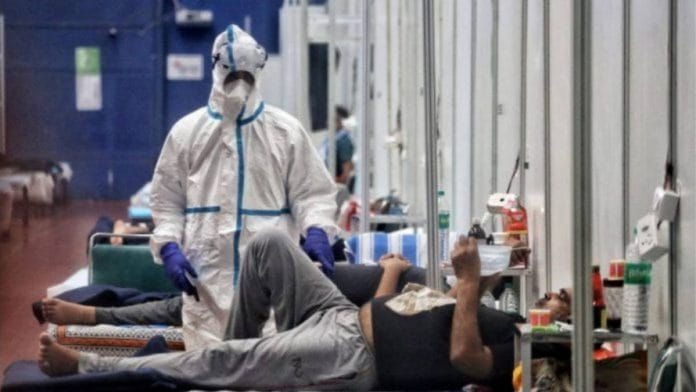New Delhi: The third wave of Covid-19 infections has hit India, with test positivity having shot up to 5 per cent from below 1 per cent within a span of a week. In the absence of a vaccine, the previous two waves saw a host of treatments — in the form of pills, injections, and convalescent plasma — to deal with the virus.
Some of the treatments fell out of favour and are no longer part of the Indian Council for Medical Research (ICMR)’s protocol. These include antiparasitic Ivermectin, Hydroxychloroquine, which is typically used to treat rheumatoid arthritis and malaria, and convalescent plasma therapy.
The introduction of vaccines has also helped build immunity against the virus and eased dependency on various drugs used for Covid treatment. Approximately 65 per cent of India’s population has taken at least one dose, according to data from covid19bharat.org, a crowd sourcing platform compiling data from all states and union territories’ health bulletins.
Treatments have also been modified, and new medicines have been introduced into the market.
Here’s a look at the new treatments for Covid as well as those that have stayed the same over the three waves.
Molnupiravir
The Central Drugs and Standard Control Organisation (CDSCO) last week approved the drug Molnupiravir for “restricted emergency use” in patients whose oxygen levels are at 93 per cent with high risk of disease progression.
Molnupiravir is an oral antiviral pill developed by pharma giant Merck that works by introducing errors into the virus’s replication. It should be taken as four 200 milligram capsules taken orally every 12 hours for five days, according to the makers. It costs Rs 1,500-1,600 for one course of the drug.
However, at a health briefing Wednesday, Dr Balram Bhargava said there are safety concerns when it comes to the indiscriminate use of Molnupiravir, which could damage bones and muscle, which is why it isn’t part of the national treatment protocol.
#Molnupiravir has major safety concerns including mutagenicity, muscle and bone damage. If this drug is given contraception has to be done for three months as child may have problems. So it is not included in national #COVID19 guidelines: Dr Balram Bhargava @ThePrintIndia
— Abantika Ghosh (@abantika77) January 5, 2022
Also read: Current Covid surge twice as fast as 2021’s 2nd wave, cases see 10-fold jump in 23 days
Plaxovid
Plaxovid is another oral antiviral pill developed by Pfizer. Though it hasn’t been approved by the Indian drug regulator yet, the pill is available for use in the UK and the US.
Plaxovid is recommended for mild to moderate cases and should be administered within five days of symptom onset, according to the makers. It works by inhibiting an enzyme the virus needs to replicate, and its effect can last longer when taken with a low dose of another antiviral pill called ritonavir.
Monoclonal antibody cocktails
Monoclonal antibody cocktails are another investigational treatment for Covid patients. Monoclonal antibodies are artificial proteins that mimic the immune system’s response to a pathogen.
India has currently approved two monoclonal antibody treatments on an emergency use basis: REGEN-COV2 (Casirivimab and Imdevimab) and LLY.N (Bamlanivimab and Etesevimab). The former is produced by Roche and Cipla, while the latter was developed by Eli Lilly.
Monoclonal antibody treatments are expensive because they take a long time to develop, and can cost approximately Rs 50,000 per dose. Each antibody cocktail has to be given in two doses, and are most effective when administered at the mild stage of disease.
Tocilizumab and Remdesivir
The ICMR has retained Tocilizumab and Remdesivir in its treatment protocol for patients with moderate to severe illness.
Remdesivir is administered intravenously in moderate patients and also works by inhibiting the virus’s replication. Tocilizumab, on the other hand, is a monoclonal antibody that works to inhibit Interleukin (IL)-6, a proinflammatory cytokine that can cause the immune system to go on overdrive, causing a cytokine storm.
Tocilizumab is advised for patients with severe Covid-19 symptoms.
Also read: Govt clears air on precaution dose — it will be the same as the first two shots






